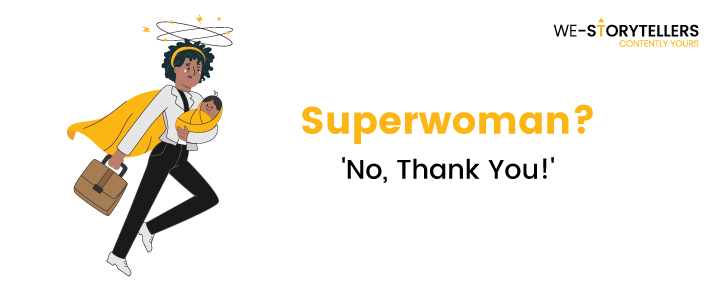She works under a glass ceiling and manages household duties around the clock. Yes, she is a superwoman; but her cape is a carapace.
Every woman has been called a Superwoman at some point in life.
Yet, an IIM (Ahmedabad) study confirms that only 5% of women reach top management positions in India. These numbers are shocking and draw attention to the obstacles a woman faces during her professional journey. Society glorifies women’s achievements with labels like superwoman but hardly acknowledges her struggles.
Unspoken challenges of a Superwoman
To understand the challenges working women face, we can use the metaphor of the tortoise and the rabbit who participated in a race. The rabbit represents a person who has the privilege to move freely in their careers and personal lives, while the tortoise represents women who have additional responsibilities and obligations that make their journey more difficult.
Initially, ‘Superwoman’ was an empowering label that played a significant role in helping women evolve over their vulnerabilities. But, just like nothing comes easy in the world, so does the Superwoman title.
The Superwoman tag sets an unrealistic idealistic bar for women that ironically weighs her down. Unfortunately, these expectations are normalized across society. This perspective makes life harder for average women who want to lead an ordinary life.
One tortoise won a race against a rabbit, and she became a legend. But not all tortoises can race against a rabbit and win.
Professional challenges
Ruchi was an outstanding sales manager in her branch. In a short time, she developed her distribution channel single-handedly. This made her a known name in banking circles. When her area manager resigned, management decided to promote a top-performing sales manager to the area manager level.
Despite being the most deserving candidate, Ruchi was sidelined, and Rohan was promoted.
Ruchi was shocked and annoyed at the same time. She questioned the decision and was told that since the area manager job demands frequent outstation travel and networking, a lady was not a good choice for the role.
So, in spite of being a good performer, Ruchi had hit the glass ceiling.
Several women face pay discrimination, bias, and gender stereotypes at their workplaces. Therefore, some obvious by-products are difficulty getting mentorship, limited access to high-profile projects and fewer promotional opportunities.
Social challenges
Generally, most thinkers focus on professional hurdles and turn a complete blind eye to social obstacles. Yet, every working woman fights silent challenges at home too. Her household responsibilities keep her on her toes.
I come from a nuclear family.
My mother – Kiran, had a full-time 9 to 5 job. She worked all around the clock. She managed everything from cooking to cleaning, attending our PTM, and fulfilling our last-minute special tiffin demands. Unfortunately, Sundays were also not for relaxing. Every Sunday, we visited my grandparents in my native village. There, my mother had to cook and wash utensils again.
Her busy schedule took a toll on her. She looked tired, annoyed and dull.
However, this isn’t just my mother’s story.
Every woman faces similar hindrances. And, because some women can fulfil all these with a smile, all women are expected to meet similar standards. So, the superwoman is more of a myth and less of a reality.
Slowly, steadily comes change
Ads often mirror society.
Several brands like Tanishq, Dove, and Cadbury – have already started exposing this harsh truth through their art, and even some brands have jumped onto the bandwagon. They are openly exposing the toxic effects of superwoman expectations through their commercials.
The Tanishq Ad is a recent example. It highlights the heavy load of expectations that comes with the superwoman tag. How a woman wakes up early, prepares breakfast, attends meetings, fulfils her social commitments and faces rejection.
The advertisement ends at a thought-provoking point where the protagonist requests not to be called a superwoman and admits that she, too, gets tired as she is as much a human as anybody else.
Such ads give voice to the undercurrents in society. Several real-life incidents also support this shift.
For instance, during the Women’s World Cup 2022, when Harmanpreet Kaur, Indian Cricketer, cried after losing, no one labelled her weak. On the contrary, society saw her sensitivity and a passionate hunger for winning. Similarly, my friend’s mother-in-law always attends her granddaughter’s friend’s birthday parties and PTM because, as a doctor, my friend hardly gets any time for herself – and no one calls her inefficient.
And yes, my mother is now a mother-in-law who hired a full-time cook for her working daughter-in-law.
Superwoman: Super, yet a woman
Until, women don’t acknowledge their hurdles, society will not introspect at all.
So, women need to admit their challenges first, and if the situation demands, ask for help from people around them. The good news is that society is receptive to hearing about women’s struggles, acknowledging their limitations, and accepting them for who they are.
We are confident that day will come soon enough when a working woman like Indra Nooyi reaches home, tired but excited about her promotion; she will not be told to keep her professional accomplishments aside and fulfil her household responsibilities at once.


